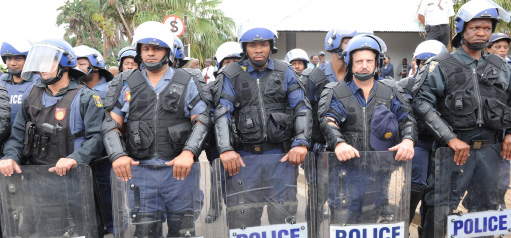New mobile police stations and specialised units will be introduced in the year ahead, helping to increase police visibility and ridding communities of crime. This is just one of the means through which the South Africa Police Service (SAPS) will fight crime that was outlined recently in the Police Ministry’s Budget Vote.
Minister Nkosinathi Nhleko said the SAPS has been allocated a budget of R80.8 billion for the 2016/17 financial year. The spending focus the medium-term will include:
- Addressing current fixed establishments.
- Professionalising the police service through skills development.
- Continued strengthening of the criminal justice system by contributing to the criminal justice sector revamp and modernisation programme.
- Strengthening the resource capability of the Public Order Policing Unit. A total of R1.957 billion has been allocated for this purpose.
“This financial year, we have increased the resourcing of the Directorate for Priority Crime Investigation (Hawks) with funding of R1. 431 billion, which will also cater for the new specialised units. A decision was taken to re-establish the Narcotics Bureau and the Firearm Investigation Combating units because of the need and the outcry of our citizens,” the Minister added.
Safer communities
Deputy Police Minister Maggie Sotyu said the roll out of mobile police stations across the country would help promote safer communities, while also restoring public confidence in the police. “The launch and subsequent roll-out of mobile police stations will start in earnest in May 2016, starting with Khayelitsha Site C, proceeding to Lavender Hill, Crossroads village in Peddie, Botshabelo in the Free State, and other crime hot spots, across the nine provinces,” she added.
 The funding of these police stations will come from the SAPS' national budget. The Deputy Minister noted that the logistics of building a police station involved a lot of departments, which meant they would take some time to complete.
The funding of these police stations will come from the SAPS' national budget. The Deputy Minister noted that the logistics of building a police station involved a lot of departments, which meant they would take some time to complete.
The terrain of most of South African rural areas also obligates government to roll out mobile police stations, she added. The Deputy Minister also emphasised the importance of policing in rural communities.
“We must ensure that the rural communities do not feel as if they are receiving second-rate policing service when compared to the urban areas. We must continue dismantling organised criminals who are bent on stealing valuable livestock from rural communities.” The Deputy Minister said that crime in rural communities was not only about stock theft, but also about gender-based violence, gangsterism, violence and substance abuse in rural schools. The challenging nature of policing rural areas, the distance between villages and isolated nature of many communities could lead to a sense of vulnerability and heightened fear of crime, she noted. “The mobile police station project will strengthen the Department’s Front Line Service Delivery Programme. This is a dedicated programme that encapsulates the professional police member that the people of South Africa require to service them; community-accessible and receptive police service delivery points; a professional and accountable service that the police should render; and establishment of effective stakeholder relations and involvement in the delivery of policing services,” she said.
Protecting vulnerable groups
The Deputy Minister added that the SAPS currently has two networks, which are used to champion the rights of the most vulnerable groups in society, especially in the rural areas. She said the SAPS Women’s Network has been involved in visionary programmes in rural areas that showed an extraordinary duty beyond policing and brought a unique dynamic to community policing.
“This network has supported the elderly victims of brutal rape, ensuring that the perpetrators of these heinous crimes are apprehended and convicted. Furthermore, the SAPS Women’s Network and Men for Change will be embarking on community outreach programme that will be addressing the problem of ukuthwala of young children, in our rural areas, especially in the Eastern Cape.”
The Deputy Minister stressed that while government respected traditions certain practices were unacceptable. We respect a tradition that builds a nation, but we abhor a so-called culture that oppresses, abuses, abducts, and rapes our children in the name of tradition. We will arrest those child abusers who abduct our children in the name of ‘customary marriage’,” she said.



 Facebook
Facebook Twitter
Twitter WhatsApp
WhatsApp